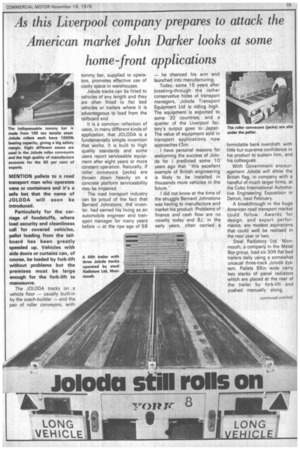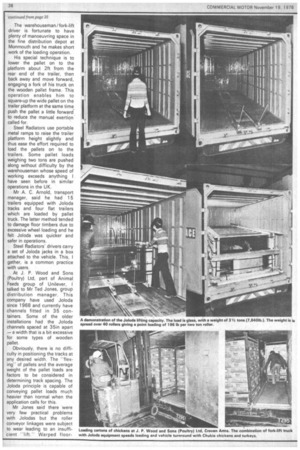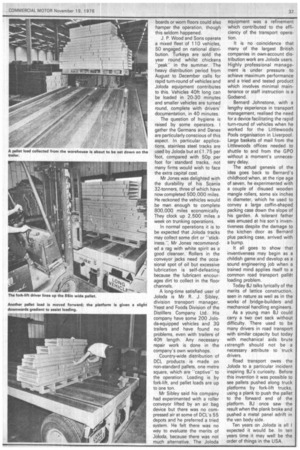As this Liverpool company prepares to attack the American market John Darker looks at some home-front applications
Page 37

Page 38

Page 39

If you've noticed an error in this article please click here to report it so we can fix it.
MENTION pallets to a road transport man who operates vans or containers and it's a safe be that the name of JOLODA will soon be introduced.
Particularly for the carriage of foodstuffs, where load security and cleanliness call for covered vehicles, pallet loading from the tailboard has been greatly speeded up. Vehicles with side doors or curtains can, of course, be loaded by fork-lift without problems but the premises must be large enough for the fork-lift to manoeuvre.
The JOLODA tracks on a vehicle floor — usually built-in by the coach-builder — and the pair of roller conveyors, with tommy bar, supplied to operators, promotes effective use of costly space in warehouses.
Joloda tracks can be fitted to vehicles of any length and they are often fitted to flat bed vehicles or trailers where it is advantageous to load from the tailboard end.
It is a common reflection of users, in many different kinds of application, that JOLODA is a fundamentally simple invention that works. It is built to high quality standards and some users report serviceable equipment after eight years or more constant operation. Naturally, if roller conveyors (jacks) are thrown down heavily on a concrete platform serviceability may be impaired.
The road transport industry can be proud of the fact that Bernard Johnstone, thd inventor, had earned his living as an automobile engineer and transport manager for many years before — at the ripe age of 58 — he chanced his arm and launched into manufacturing.
Today, some 15 years after breaking-through the rather conservative hides of transport managers, Joloda Transport Equipment Ltd is riding high. The equipment is exported to some 30 countries, and a quarter of the Liverpool factory's output goes to Japan. The value of equipment sold in transport applications now approaches £5m.
I have personal reasons for welcoming the success of Joloda for I predicted some 10 years ago that "this excellent example of British engineering is likely to be installed in thousands more vehicles in the future."
I did not know at the time of the struggle Bernard Johnstone was having to manufacture and market his product. Problems of finance and cash flow are no novelty today and BJ, in the early years, often carried a formidable bank overdraft, with little but supreme confidence in his product to sustain him, and his colleagues.
With Government encouragement Joloda will show the British flag, in company with a handful of much larger firms, at the Cobo International Automotive Engineering Exposition in Detroit, next February.
A breakthrough in the huge American road transport market could follow. Awards for design, and export performance, are modest aspirations that could well be realised in the next year or two.
Steel Radiators Ltd, Monmouth, a company in the Metal Box group, load six 30ft flat bed trailers daily using a somewhat unusual three-track Joloda system. Pallets 86in wide carry two stacks of panel radiators which are placed at the rear of the trailer by fork-lift and pushed manually along. The warehouseman/fork-lift driver is fortunate to have plenty of manoeuvring space in the fine distribution depot at Monmouth and he makes short work of the loading operation.
His special technique is to lower the pallet on to the platform about 2ft from the rear end of the trailer, then back away and move forward, engaging a fork of his truck on the wooden pallet frame. This operation enables him to square-up the wide pallet on the trailer platform at the same time push the pallet a little forward to reduce the manual exertion called for.
Steel Radiators use portable metal ramps to raise the trailer platform height slightly and thus ease the effort required to load the pallets on to the trailers. Some pallet loads weighing two tons are pushed along without difficulty by the warehouseman whose speed of working exceeds anything I have seen before in similar operations in the UK.
Mr A. C. Arnold, transport manager, said he had 15 trailers equipped with Joloda tracks and four flat trailers which are loaded by pallet truck. The latter method tended to damage floor timbers due to excessive wheel loading and he felt Joloda was quicker and safer in operations.
Steel Radiators' drivers carry a set of Joloda jacks in a box attached to the vehicle. This, I gather, is a common practice with users.
At J. P. Wood and Sons .(Poultry) Ltd, part of Animal Feeds group of Unilever, I talked to Mr Ted Jones, group distribution manager. This company have used Joloda since 1968 and currently have channels fitted in 35 containers. Some of the older installations had the Joloda channels spaced at 35in apart — a width that is a bit excessive for some types of wooden pallet.
Obviously, there is no difficulty in positioning the tracks at any desired width. The -flexing" of pallets and the average weight of the pallet loads are factors to be considered in determining track spacing. The Joloda principle is capable of conveying pallet loads much heavier than -normal when the application calls for this.
Mr Jones said there were very few practical problems with Jolodas but the roller conveyor linkages were subject to wear leading to an insufficient "lift." Warped floor boards or worn floors could also hamper the operation, though this seldom happened.
J. P. Wood and Sons operate a mixed fleet of 110 vehicles, 50 engaged on national distribution. Turkeys are sold the year round whilst chickens "peakin the summer. The heavy distribution period from August to December calls for rapid turn-round of vehicles and Joloda equipment contributes to this. Vehicles 40ft long can be loaded in 20-30 minutes and smaller vehicles are turned round, complete with drivers' documentation, in 40 minutes.
The question of hygiene is raised by some operators. I gather the Germans and Danes are particularly conscious of this aspect. In particular applications, stainless steel tracks are used by Joloda but at £1.75 per foot, compared with 50p per foot for standard tracks, not many firms would wish to face the extra capital cost.
Mr Jones was delighted with the durability of his Scania 32-tonners, three of which have now completed 500,000 miles. He reckoned the vehicles would be man enough to complete 800,000 miles economically. They clock up 2,500 miles a week on trunking operations.
In normal operations it is to be expected that Joloda tracks may collect some dirt or "stickiness.", Mr Jones recommended a rag with white spirit as a good cleanser. Rollers in the conveyor jacks need the occasional spot of oil but excessive lubrication is self-defeating because the lubricant encourages dirt to collect in the floor channels.
A long-time satisfied user of Joloda is Mr R. J. Sibley, division transport manager, -Yeast and Foods Division of the Distillers Company Ltd. His company have some 200 Joloda-equipped vehicles and 30 trailers and have found no problems, even with trailers of 40ft length. Any necessary repair work is done in the company's own workshops.
Country-wide distribution of DCL products is made on non-standard pallets, one metre square, which are "captive" to the operation_ Loading is by fork-lift, and pallet loads are up to one ton.
Mr Sibley said his company had experimented with a roller conveyor lifted by an air bag device but there was no compressed air at some of DCL's 55 depots and he preferred a tried system. He felt there was no way to evaluate the merits of .Joloda, because there was not much alternative, The Joloda
equipment was a refinement which contributed to the efficiency of the transport operation.
It is no coincidence that many of the largest British companies in own-account distribution work are Joloda users. Highly professional management is under pressure to achieve maximum performance and a tried and tested product which involves minimal maintenance or staff instruction is a Godsend.
Bernard Johnstone, with a lengthy experience in transport management, realised the need for a device facilitating the rapid turn-round of vehicles when he worked for the Littlewoods Pools organisation in Liverpool. Large baskets of mail from the Littlewoods offices needed to shuttle to and from the GPO without a moment's unnecessary delay.
The actual genesis of the idea goes back to Bernard's childhood when, at the ripe age of seven, he experimented with a couple of disused wooden mangle rollers, some six inches in diameter, which he used to convey a large coffin-shaped packing case down the slope of his garden. A tolerant father was amused at his son's inventiveness despite the damage to the kitchen door as Bernard plus packing case, arrived with a biut all goes to show that inventiveness may begin as a childish game and develop as a sound engineering job when a trained mind applies itself to a common road transport pallet loading problem.
Today BJ talks lyrically of the merits of lattice construction, seen in nature as weil as in the works of bridge-builders and mechanical handling engineers.
As a young man BJ could carry a two cwt sack without difficulty. There used to be many drivers in road transport with similar capacity but today with mechanical aids brute • strength should not be a necessary attribute to 'truck drivers.
Road transport owes the Joloda to a particular incident inspiring BJ 's curiosity. Before this invention it was possible to see pallets pushed along truck platforms by fork-lift trucks, using a plank to push the pallet to the forward end of the platform. BJ once saw the result when the plank broke and pushed a metal panel adrift in the van body side.
Ten years on Joloda is all I expected it would be. In ten years time it may well be the order of things in the USA.




































































































